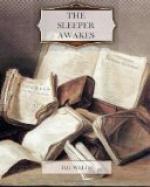This drew his attention to the fact that the bright lighting of these rooms was due to a multitude of very faint glow lamps set about the cornices. There were no windows. And he began to recall that along all the vast chambers and passages he had traversed with Howard he had observed no windows at all. Had there been windows? There were windows on the street indeed, but were they for light? Or was the whole city lit day and night for evermore, so that there was no night there?
And another thing dawned upon him. There was no fireplace in either room. Was the season summer, and were these merely summer apartments, or was the whole city uniformly heated or cooled? He became interested in these questions, began examining the smooth texture of the walls, the simply constructed bed, the ingenious arrangements by which the labour of bedroom service was practically abolished. And over everything was a curious absence of deliberate ornament, a bare grace of form and colour, that he found very pleasing to the eye. There were several very comfortable chairs, a light table on silent runners carrying several bottles of fluids and glasses, and two plates bearing a clear substance like jelly. Then he noticed there were no books, no newspapers, no writing materials. “The world has changed indeed,” he said.
He observed one entire side of the outer room was set with rows of peculiar double cylinders inscribed with green lettering on white that harmonized with the decorative scheme of the room, and in the centre of this side projected a little apparatus about a yard square and having a white smooth face to the room. A chair faced this. He had a transitory idea that these cylinders might be books, or a modern substitute for books, but at first it did not seem so.
The lettering on the cylinders puzzled him. At first sight it seemed like Russian. Then he noticed a suggestion of mutilated English about certain of the words.
“Thi Man huwdbi Kin” forced itself on him as “The Man who would be King.”
“Phonetic spelling,” he said. He remembered reading a story with that title, then he recalled the story vividly, one of the best stories in the world. But this thing before him was not a book as he understood it. He puzzled out the titles of two adjacent cylinders. “The Heart of Darkness” he had never heard of before nor “The Madonna of the Future”—no doubt if they were indeed stories, they were by post-Victorian authors.
He puzzled over this peculiar cylinder for some time and replaced it. Then he turned to the square apparatus and examined that. He opened a sort of lid and found one of the double cylinders within, and on the upper edge a little stud like the stud of an electric bell. He pressed this and a rapid clicking began and ceased. He became aware of voices and music, and noticed a play of colour on the smooth front face. He suddenly realised what this might be, and stepped back to regard it.




